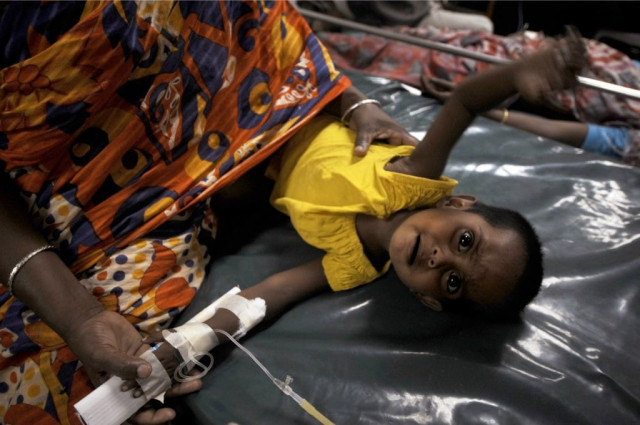India unveils vaccine for deadly diarrhoea virus
"A total 25 percent of all diarrhoeal hospital admissions will be prevented by this vaccine," says Bhan.

Rotavirus causes up to 884,000 hospitalisations in India a year. PHOTO: AFP
Rotavirus, which causes severe diarrhoea, is globally responsible for some 453,000 deaths annually and is particularly dangerous in the developing world where swift health care is often out of reach.
Secretary of India's Department of Biotechnology K. Vijaraghavan who led the quest for an affordable vaccine, said it was a product of international cooperation although it has yet to be approved by Indian drug authorities.
"For the first time, we have taken a vaccine from the earliest discovery to every stage of development and that is a very remarkable thing for India," he said, adding that the $1-a-dose oral vaccine was ready for production.
While international pharmaceutical giants GlaxoSmithKline and Merck produce similar vaccines, each dose costs around 1,000 rupees ($18), said Sushmita Malaviya of PATH, an international health care organisation.
Rotavirus causes up to 884,000 hospitalisations in India a year, at a cost to the country of 3.4 billion rupees ($72 million), and kills around 100,000 small children annually in the country, the government says.
The Indian vaccine named Rotavac will be made by Hyderabad-based Bharat Biotech, which has said it has the capacity to mass-produce tens of millions of doses after clearance is given, expected in eight or nine months.
Sheela Panicker, a Bharat Biotech spokesperson, said the drops will be used in India and in other developing countries.
"We have pledged it to the government and the vaccine will be also be supplied to developing countries through a UN agency," she said.
Vijaraghavan's predecessor, M.K. Bhan, pioneered the vaccine project after scientists discovered a local strain of rotavirus 23 years ago in a New Delhi hospital.
"A total 25 percent of all diarrhoeal hospital admissions will be prevented by this vaccine," Bhan said.
"That means you will have 25 percent fewer diarrhoeal illnesses of a severe nature in India, which is a very substantial public health gain," he said.
India has been a powerhouse in developing cheap medicines to treat diseases such as cancer, tuberculosis and AIDS for those who cannot afford expensive branded versions across the developing world.



















COMMENTS
Comments are moderated and generally will be posted if they are on-topic and not abusive.
For more information, please see our Comments FAQ